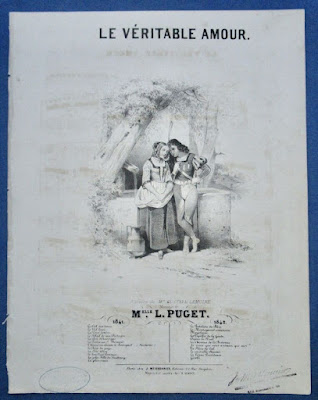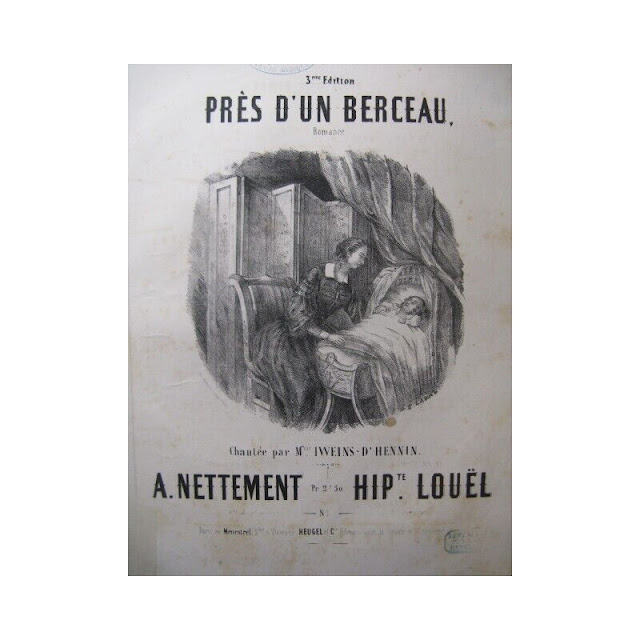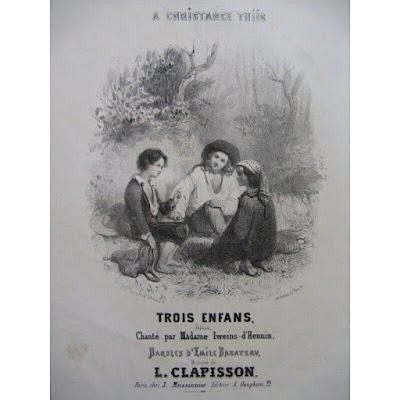IWEINS D’HENNIN, Elisa [née d’ HENNIN, Elisa Amélie Mélanie] (b Lille 28 March 1814; d Passy 5 December 1886)
Elisa d’Hennin was one of the most praised and prized concert vocalists of mid-nineteenth century France. She, along with Madame Gaveaux-Sabatier, reigned over the popular era of the French ‘romance’ and she made herself a name, therein, second to none.
As far as I know, Elisa never appeared on the stage – although she sang all kinds of operatic music in concert – and there never seems to have been any question of her doing so. Yet, apparently, her voice, variously referred to as a mezzo-soprano and a contralto, yet perhaps – given what she sometimes sang – more of a dramatic soprano, was both powerful and passionate.
Another remembering writer explained ‘Elle était douée surtout d’un talent de diction de premier ordre; l’accent était superbe et l’expression portée au plus haut point. Il était difficile de retenir les larmes quand elle chantait le ‘Plaisir d’amour’ de Martini ou ‘La Plainte du mousse’ d’Abadie. Madame Iweins was quite simply an outstanding performer in her own genre – part way between ballad and art-song – and she made that genre her own.
At 22, Elisa, who at some stage put herself into the hands of the former tenor, now teacher, Antoine Ponchard, had already begun singing in public. I spot her first at the Salle St-Jean in December 1836 (‘la voix si douce et si pure’), at the Salle Chantereine the following month, alongside the young tenor, Hüner, on 25 February 1837, giving a concert in her home town, and 11 March teaming with Henri Lanza in another. She wasn’t quite the seasoned professional yet. She gave them ‘Robert, toi que j’aime’ and, when a top note didn’t come out quite as she wished, a gentle tear glistened on her cheek. They wouldn’t glisten often over the years to come.
Her studies completed, she launched herself upon the concert scene: at the Salle St-Jean (‘Vaccai … avec une énergie dramatique qui a electrisé l’auditoire’), at the Cercle du Faubourg St-Germain, at the concert of the Athenée Musicale (Mariano Faliero ‘un talent éminemment dramatique’), at the Théâtre des Menus-Plaisirs (‘Mlle d'Hennin, qui a chanté un air de Mozart, est une jeune artiste de mérite dont la voix ne manque ni de charme, ni d'énergie’) or, with Hüner, singing more romances (‘Mlle d'Hennin, comme de coutume, a déployé une puissance et une expression admirables’, ‘MlIe d'Hennin, comme de coutume, a fait admirer sa voix si pleine de nerf et de puissance dramatique’, ‘Mlle d'Hennin a pris une part active à la dernière matinée, et sa belle voix, comme partout, a provoqué les plus vifs applaudissements’.) One of her earliest notable song successes was with Amédée de Beauplan’s ‘Le Pardon’, and she also featured Vogel’s ‘Ne me regarde plus’ and Elwart’s ‘Le Chalumeau’ and ‘Les trois anges gardiens’.
She returned to Lille (25-26 June 1838) to take the soprano solos, alongside Mlle Janssens, Alexis Dupont, Géraldy and Lanza in the 2nd Festival du Nord. The hometown girl was welcomed with acclaim: ‘Au moment où Mlle d'Hennin a paru, des applaudissements ont retenti dans toute la salle … brillant avenir … voix si vibrante si passionnée ..’, She sang the Queen of the Night’s vengeance aria from Les Mystères d’Isis (Der Zauberflöte), Cherubini’s Ave Maria, and joined in ensembles from The Creation, Bianca e Faliero, Les Huguenots and Anna Bolena. Thereafter, the young singer moved on to Boulogne, Valenciennes, Arras, St Omer, and the like, until the Paris season leaped into life, and she returned to town.
She was seen in several concerts with Ponchard, including one where they created a cantata by the young César-Franck, but she was in great demand in the provinces, and so she was soon off to Marseille and Bordeaux in a plethora of concert dates. At several concerts in January 1840, she performed Giuseppe Concone’s scena Elizabeth and Amy Robsart with Mlle Lavoye, and on one of these occasions the critic gave us perhaps the most comprehensible description of her voice: ‘Mademoiselle d’Hennin avec une voix d’une vaste étendue qui réunit l’éclat du soprano aux larges et belles intonations du contralto …’.
During the months of the season, Elisa appeared regularly at the Salle Herz, the Concerts de l’Athénée, and at the matinees and soirees of the city’s musicians (Trinquart, Huerta, Alard, Lacome et al) and songwriters. On the occasion of one of these, given by Loïsa Puget, she shared the bill with Julie Dorus-Gras who delivered the showy Cheval de bronze ‘Veuvage’ aria. ‘Mais la voix puissante et dramatique de Mlle d'Hennin a dignement lutté avec Mme Dorus, et, pour bien des convictions, la victoire est restée indécise …’.
At the concert hosted by the newspaper La Sylphide she again appeared alongside Dorus-Gras and the third vocalist was none other than Esther Julian, now a successful operatic singer. At the concert of Le Ménestral, Rosine Stoltz and Duprez were billed, and Elisa still sang her Queen of the Night.
On 5 April 1841 she gave another concert of her own: ‘Adressons des éloges sans restriction à Mlle d'Hennin, pour la façon dont elle a chanté la romance de Mlle Puget, ‘Le Val béni’. Mlle d'Hennin a fait de cette goutte de rosée, un diamant…’. And then it was off to Bordeaux, Lille and to the Festival at Roubaix: ‘Mlle Elisa d'Hennin a chanté, au concert de la fête de Roubaix, une nouvelle mélodie de M Frédéric Bérat, intitulée: ‘C'est demain qu'il arrive les larmes’, les applaudissements et les honneurs du bis,’
The new songs and the concerts arrived in afresh 1842. Loïsa Puget’s new album ‘a encore trouvé un digne interprête en Mlle d'Hennin, qui a très-bien dit le véritable amour’, Frédéric Bérat’s ‘C’est demain qu’il arrive’ proved popular, although one critic found it a bit cheap, Dessauer’s ‘Les deux cerceuils’ was rather more tear-jerking. But, like Charlotte Dolby, in English later years, Elisa didn’t just give her ballads and songs – Flotow’s ‘Maria’, Joseph Vimeux’s ‘Par pitié, rest encore’, ‘La Montagnarde au départ’… On March 19, she sang Rossini’s Stabat Mater – premiered only weeks before in Paris -- at Beauvais, with Alexis Dupont, Oller and Lia Duport, and in May repeated it, with the same colleagues, at the Le Mans Festival. In between, at Ponchard’s concert, she delivered an aria from La Reine de Chypre (alongside a piece by Guitarrero). Mlle d’Hennin was nothing if not versatile.
She was also no longer Mlle d’Hennin. The papers reported, in the reviews of the Ponchard concert, that she had married, the previous day, Mons Alexis Iweins. Henceforth, she would be, in the cumbrous fashion of the day, Mme Iweins-d’Hennin.
Mons Iweins (d Passy 12 November 1873) – who henceforth called himself Iweins-d’Hennin – seems to have been a sort of journalist at Le Ménestral. But he was also a useful tenor singer (tenor jeune et grand par la taille, et assez flatteur par la voix’) and for a decade he would have a pleasant career, touring and performing with his wife, without shaking the earth. The couple presented their first concert in July 1842: ‘M et Mme Iweins d'Hennin faisaient les honneurs. M Iweins possède une voix de ténor de la plus grande fraîcheur: rien d'aussi joli à entendre qu'un nocturne de Gabussy ou de Carully, par M et Mme Iweins d'Hennin’. And the songs kept coming. ‘Le Mal d’amour’ by Monpou, songs from the pen of Charles Dancla, Loïsa Puget’s ‘Fleurette’ and ‘La Fiancée de Chambéry’ (‘qu'elle dit à ravir’) as the couple took to the road (‘M et Mme Iweins d'Hennin sont actuellement à Cauterets, où ils viennent de donner un très beau concert’ … ‘M et Mme Iweins-d'Hennin viennent d'obtenir le plus brillant succès dans leur concert du 31 août, salle de Frascati’, ‘M et Mlle Iweins-d'Hennin essaient, en province, tous les jolis duos du repertoire, et les concerts de Paris en profiteront à la prochaine saison’, ‘M et Mme Iweins d'Hennin, ces deux artistes viennent d'y donner plusieurs nouveaux concerts, dans lesquels ‘Fleurette’ et ‘Les Yeux d'une Mère ou Huit ans d'absence’, ont obtenu un immense succès.’
Strange, of those three ex-aequo first prize-winners it was only the youngest, Mlle Julian, who went for an international opera career. Mlle d’Hennin had a grand concert career at home, and Mme Potier. Well, hers is another story. Flung on for a debut at the Opéra-Comique when Castellan walked, she did surprisingly well. But soon devolved into teaching.
But the teaching part of her life did not impinge on Elisa (and conjointly Alexis’s) performing and, above all, travelling life.
That performing and travelling life was not something of which stories are made. It was uniformly successful, and only rarely left France for Belgium or Holland or Baden-Baden, as well as taking in festivals such as those at Reims or Roubaix: ‘M et Mme Iweins d'Hennin continuent leur brillante tournée en Hollande. Le 6 de ce mois [December 1843], ils ont eu l'honneur de chanter à La Haye devant le roi et la reine, le prince et la princesse d'Orange et toute la cour. La cantatrice a d'abord chanté le grand air de La Reine de Chypre, et ensuite …’ Romances, chansonnettes and duets. On to Amsterdam, Rotterdam, Utrecht ... and then Laval, Arras, and back to the Salle Herz, to start the round again.
This year, alongside the latest romances (Henrion’s ‘Le Mouchoir de Therèse’, 'La Fortune du Pâtre’, ‘Notre Dame des Paquerettes’, Monpou’s ‘L’Enfant perdu’, Aristide Latour’s ‘Sur l’eau’ et al), the couple featured a selection from Donizetti’s recent Dom Sebastian, Iweins singing the music created by Duprez and Elisa that which had been the lot of Rosine Stolz (‘Sol adoré’) as they set out to Orleans, Le Mans, Vincennes, Tours (where Elisa popped in her Queen of the Night), Courtrai, the Roubaix Festival … And the reception and notices were as grand as ever ‘[elle a] arraché les applaudissements et les larmes’, ‘powerful voice, dramatic and passionate’.
And so it continued. Madame Iweins (and sometimes Monsieur, until he faded from the scene) delivered her mixture of operatic arias (Le Prophète) and the romances of Puget, Clapisson, Haas and the other ‘albumnistes’, to town and country, to undiminished delight and applause, through the 1840s and into the 1850s (still 'Plaisir d’amour’, ‘Huit ans d’absence’, ‘Les Chèvres d’Argos’, ‘Ce que femme veut’, Puget’s ‘Roses et Quenouilles’, Abadie’s ‘La Plainte du mousse’) before, at the last, devoting herself almost wholly to teaching, with only the odd, usually charitable, return to the concert platform, as late as the 1860s.
Latterly, the couple retired to Passy, where he died in 1873 and she in 1886.
 |



































No comments:
Post a Comment